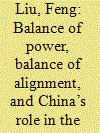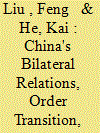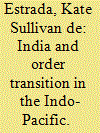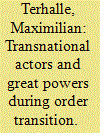|
|
|
Sort Order |
|
|
|
Items / Page
|
|
|
|
|
|
|
| Srl | Item |
| 1 |
ID:
190663


|
|
|
|
|
| Summary/Abstract |
The Indo-Pacific region has become a central focus of great power competition. Not surprisingly, a rising China seeks to play an important, if not a leading role in the transformation of Asia’s present regional order. The United States, meanwhile, as the unipole, has strong incentives to prevent the rise of a peer competitor. Facing certain structural and domestic constraints, China is disinclined to resort to the strategy of violent revision or subversion historically pursued by previous rising powers. Instead, China has pursued a gradual change of the existing regional order through a combination of internal balancing and external reassurance strategies. Specifically, China’s quest for great power status in the region, particularly in response to the Indo-Pacific strategy adopted by the United States since the Trump administration, has prompted its proactive shift to counterbalance the US’ vision of order in the region. This paper argues that the balance of power and the balance of alignment constitute two key variables that affect the prospect of Sino-US competition for a preferable regional order. Beijing’s balancing strategies have significantly enhanced its economic and military capabilities, reducing the gap with the United States on the one hand and attracted certain regional states to join China-led regional initiatives on the other. However, owing to the complex balancing dynamics in the region and the agency of small and middle powers, the balance of alignment supports neither American nor Chinese dominance of Asia. Contrary to the ‘new Cold War’ narrative, the contest for order does not entail dividing the region into two rival blocs, but rather creating certain overlapping groupings and coalitions led by the two great powers. It consequently also signifies that the current order transition under a new bipolarity will be prolonged and relatively stable compared to the Cold War bipolarity.
|
|
|
|
|
|
|
|
|
|
|
|
|
|
|
|
| 2 |
ID:
168511


|
|
|
|
|
| Summary/Abstract |
A dualistic-order thesis has been emerged as a widely-used concept to describe East Asia’s regional dynamics. According to the thesis, the economic and security spheres of the region have become divorced from one other, whereby China and the United States dominate the economic and security realms, respectively. This paper demonstrates the deficiencies of this thesis, based on a comprehensive assessment of the economic and security developments in the region, as well as the strategic choices of small and middle regional powers. In order to form a more accurate and systematic understanding of regional prosperity and stability, this paper develops an economy-security nexus approach by integrating the interactions of regional actors in both the economic and security realms into a unified framework. From this perspective, East Asian regional order is sustained by a delicate coupling of regional economic and security configurations: ‘hot economics’ is accompanied with cooperative security interactions. Although China and the United States are not the dominant actors in either field, their relatively benign interactions in both realms collectively play a significant role by shaping the strategic environment for regional actors, allowing them to enjoy a large degree of strategic flexibility and increase their security and prosperity.
|
|
|
|
|
|
|
|
|
|
|
|
|
|
|
|
| 3 |
ID:
189319


|
|
|
|
|
| Summary/Abstract |
The shifting balance of power and the growing strategic competition between China and the United States have accelerated the order transition in the international system. The nature and process of the order transition, peacefully or confrontationally, largely depend on how China interacts with the United States and other players in the region, especially Australia, Japan, and India. In this article, we introduce an "interest-threat nexus" model to shed some light on why China has formed different types of bilateral relations with key players in the region. We argue that China's bilateral relations are shaped by two perceptual factors: security threat and economic interest. While the threat perception shapes the "identity" feature of the bilateral relationship as partnership or rivalry, the "behavioral" feature of the relationship—cooperative or competitive in action—is largely influenced by the economic interests between the two countries. A systematic and nuanced analysis of China's bilateral relations with major regional players will help us to understand the changing dynamics of the order transition in the Indo Pacific.
|
|
|
|
|
|
|
|
|
|
|
|
|
|
|
|
| 4 |
ID:
190668


|
|
|
|
|
| Summary/Abstract |
Managing order transition in the Indo-Pacific is as much about negotiating the character of regional order as it is about mounting balance of power challenges or establishing countervailing institutional arrangements. For this reason, members of the Quad have expressed ambitions to deliver shared security on the basis of collective identity and values—though at times more in discourse than in practice. This article argues that India is actively contesting and, in some ways reconfiguring, the legitimating narratives of the Quad as an Indo-Pacific ‘security community’. Under the leadership of Narendra Modi, India has approached the socialising imperative of liberal identity cues selectively and ambivalently. More widely, India has declined to pursue an overt, collective strategy of Chinese containment and has propounded distinctive visions of regional security provision. India’s vision for liberal order in the Indo-Pacific stands apart from the ‘security community’ that the other Quad partners have enunciated in their foreign policy discourse, with consequences for the future of order transition in the Indo-Pacific.
|
|
|
|
|
|
|
|
|
|
|
|
|
|
|
|
| 5 |
ID:
158729


|
|
|
|
|
| Summary/Abstract |
The dawn of the twenty-first century witnessed a new wave of multilateral initiatives in the Asia-Pacific. By integrating institutional balancing theory and role theory, the author proposes a new theoretical framework—‘balance of roles’—to explain the variations in institutional strategies by different states. It is argued that a state’s role conception will shape its institutional balancing strategies in an order transition period. An order defender, like the USA, is more likely to adopt exclusive institutional balancing to exclude its target from its dominated institutions. An order challenger, such as China, will choose both inclusive and exclusive institutional balancing to maximise its own power and legitimacy in a new international order. As a kingmaker, a proactive second-tier state is more likely to pick an inter-institutional balancing strategy to initiate new institutions for competing for influence with existing institutions. An institutionalised order transition might be more peaceful than widely perceived.
|
|
|
|
|
|
|
|
|
|
|
|
|
|
|
|
| 6 |
ID:
147378


|
|
|
|
|
| Summary/Abstract |
This article rests on the assumption of the “complexity, messiness, power relations, and contested character of the contemporary dualistic system,” which comprises great powers and “superimposed, functionally differentiated global subsystems of world society” (Cohen 2012:5). The article argues that this framework is being shaped by the current transition of global order. In turn, this raises the question how the state-led negotiation of today's order transition can be understood against the backdrop of a post-Westphalian environment. The article challenges the widespread argument pertaining to the “autonomy of transnational actors” by suggesting that the influence of nonstate actors is dependent on a particular institutional context in which the key political questions framing a social order are settled. Whereas research on international institutions and their design simply assumes that this is the case, here it is argued that unless these framing patterns are agreed upon by major powers, the respective order and its elements, that is, institutions and regimes, remain contested or deadlocked. When this happens, the political impact of non-state actors is largely neutralized or strongly weakened and their effective autonomy from great powers is minimized.
|
|
|
|
|
|
|
|
|
|
|
|
|
|
|
|
|
|
|
|
|